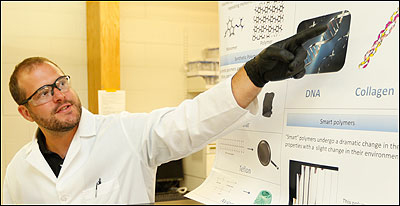Assistant Professor of Biomedical Engineering Craig L. Duvall has received a Society for Biomaterials 2015 Young Investigator Award for his achievements in the field of biomaterials research within 10 years of receiving his doctorate.
The award will be presented at the Society’s 2015 annual meeting in Charlotte, N.C., April 15-18. His manuscript, “Conjugation of Palmitic Acid Improves Potency and Longevity of siRNA Delivered via Endosomolytic Polymer Nanoparticles,” will be published in the Journal of Biomedical Materials.
“Professor Duvall is at the forefront of the younger — than me — generation of biomaterials scientists who are designing new biomaterials across length scales — from the nanoscopic to the macroscopic — and applying these for the synthesis of new drug delivery systems,” said nominator Professor Ashutosh Chilkoti, biomedical engineering, Duke University.

Duvall conducts research on advanced drug delivery systems designed for regenerative medicine applications including enhancing the performance of stem cell therapies for use in tissue engineering, stimulating healing of non-healing skin wounds, improving long-term performance of vascular bypass grafts, and reducing tissue destruction in degenerative diseases such as osteoarthritis.
Duvall’s lab conducts research on projects in these areas sponsored by the American Heart Association, the National Institutes of Health, the Department of Defense, and the National Science Foundation, which funds seven of Duvall’s trainees through its graduate research fellowship program.
Duvall also is a 2014 recipient of a National Science Foundation CAREER Award. For this grant, Duvall’s research is targeted at developing injectable hydrogels that contain adult stem/stromal cells, which are in plentiful supply and relatively easy to harvest, to promote wound healing in diabetic patients who are more susceptible to non-healing skin wounds.
The biomaterial has the potential to help hold stem cells in place at the wound, while simultaneously delivering a drug to the cells that will promote their survival, growth and wound regenerative function. It can be injected directly into the wound as a liquid that rapidly “gels” and then is slowly resorbed over time as the wound heals.
Duvall has published 38 journal articles (an additional four are in review), four book chapters, and 12 patents/invention disclosures. Since receiving his doctorate degree, he has published 33 articles and two book chapters, 22 of which he is listed as either lead or senior author. Including the 12 patents/invention disclosures, this results in 6.7 publications per year since receiving his Ph.D.
Duvall joined the Vanderbilt engineering faculty in January 2010 from the University of Washington where he was a member of the bioengineering department. He earned a Ph.D. in biomedical engineering in 2007 at the Georgia Institute of Technology.
Contact:
Brenda Ellis, (615) 343-6314
Brenda.Ellis@Vanderbilt.edu
Twitter @VUEngineering